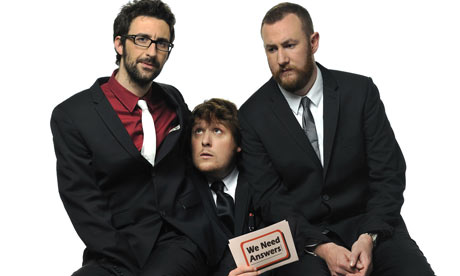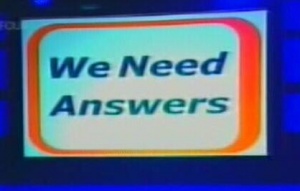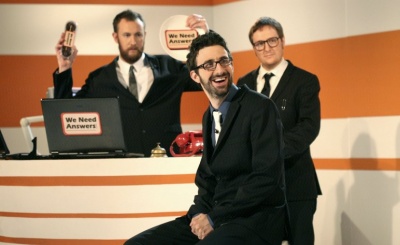We Need Answers
Contents |
Host
Mark Watson, Tim Key and Alex Horne
Broadcast
BBC Four, 12 February 2009 to 23 February 2010 (16 episodes in 2 series)
Synopsis
Comedy panel game based on offbeat questions with genuine answers. All of the questions were asked by real people to a real service promising to answer any query in one real text message. For real.
The thing that strikes you immediately is that this isn't so much based on the creators' stage show, as a straight filming of it. It looks theatrical, because that's exactly what it is. Watson, Key and Horne originally ran the show as a knockout quiz at the 2007 Edinburgh Fringe, with other comedians appearing as contestants. The TV show drops the knockout structure, but is otherwise a faithful reproduction of the stage show. Perhaps a little too faithful, because there are certain things that we're sure work in the theatre but don't necessarily work for viewers at home, most obviously the bit where everybody sings the "Let's Meet The Contestants" song (which consists of the phrase "let's meet the contestants" repeated over and over again for as long as it takes for Watson to carry out the suggested action) - a bit of audience participation that is no doubt great fun if you're part of the participating audience, but wears thin rather quickly on screen.
Before we get to meet the contestants, we have to meet the hosts, all three of them. Mark Watson is our compere, adjudicator and peacemaker; Tim Key does the actual asking-of-the-questions; and Alex Horne provides surreal analysis, deliberately shabby computer graphics and silly jingles. They've been performing in each other's stage shows for years and interact so naturally that it becomes impossible to tell where the planned gags end and the ad-libs begin. This is a good thing.
Let's meet the contestants, let's meet the contestants, let's meet the... yes, that's enough. The two celebrity contestants are seated on tall stools in the centre of the stage, and are joined at the start of each round by questionmaster Tim Key, sat in a low armchair which slides forward through doors in the back in the set before coming to a sudden halt between the stools (the jolt imparted to Key at this point is a charmingly subtle recurring gag).
 Watson, Key and Horne: the world's worst ZZ Top tribute band (with the possible exception of ZZ Top)
Watson, Key and Horne: the world's worst ZZ Top tribute band (with the possible exception of ZZ Top)The first round is Burning Issues and Fiddly Questions, in which the contestants are asked questions in turn, mostly based on a theme announced at the start of the episode (though these can be quite vague - "Women, and Steven Gerrard" being one particularly unhelpful example). Two points for a a right answer, one for a "quite right" (but not completely accurate) one.
Round two, You or Him/Her, is the tried-and-tested-and-regularly-ripped-off A Question of Sport "Home or Away" principle in just about its most basic form, the contestants having the choice of answering questions either on themselves, or on their opponent.
Round three is the Physical Challenge, which is... a physical challenge. These have included games such as seeing which celebrity can stuff the most grapes in their mouth, or who can shout extracts from their autobiographies the loudest.
Finally there's the inevitable quickfire round, questions on the buzzer for double points.
At the end, the loser is made to stomp off stage in the Clogs Of Defeat, while the winner gets to play the House Prize Showdown to win something from one of the hosts' houses.
In between, and indeed often during, these bouts of quiz, there are all manner of interjections and diversions, many of them taking the form of computer graphic animations displayed on the screen behind the contestants and often containing jokes invisible to the casual viewer but rewarding the nimble-fingered frame-freezer. In the earlier shows there would usually be a "a sad question" which would be heralded by an overlong "It's a sad question, it's a very sad question" jingle-cum-song-cum-chant, which later diversified into "sexy" and "gross" questions, also with their own musical cues. Horne, who is responsible for playing these things in at the appropriate point (or at an inappropriate point as the mood takes him), also provides something approaching "analysis" of how the game's going, video replays of the physical challenge round, and a considerable quantity of height. (6'2", according to the man himself - Wikipedia used to give his height as 6'11", but then it also used to say that Claire Sweeney was part-owner of the Flatiron Building in New York, so yah sucks boo to Wikipedia.)
Anyhow, the upshot of all this is an often hilarious show, but while it may superficially resemble a kind of Shooting Stars filtered through Trev and Simon, there's actually one part of the show that significantly isn't played for laughs, and it's the answers to the quiz. The questions may be offbeat, frivolous, or just phrased in a ludicrous manner, but no matter how stupid the questions may seem to be, they always have a sensible answer, and giving that answer scores points. Which is a principle we applaud, lustily.
No More Women
As a kind of on-line bonus, the BBC Comedy blog hosted a series of short webisodes [is that still a word? - Ed] made as a kind of online companion to We Need Answers. It was described by Alex Horne thusly:
No More Women is a name game. The first player has to name a celebrity, e.g. 'John Prescott', then a category which they fall into and must subsequently be avoided - e.g. 'No More Politicians'. The opponent then names another celebrity who is not a Politician. As more and more categories are added it gets harder, and eventually impossible, to name anyone new. The game itself requires memory and invention (rather than ball skills, dice, luck or wrestling moves). It's fun to play and, maybe, entertaining to watch.
Inventor
Adapted from the Edinburgh stage show devised by the hosts Mark Watson, Alex Horne and Tim Key.
Trivia
For the record, the winner of the inaugural Edinburgh Fringe version in 2007 was Paul Sinha and the 2008 champion was Josie Long.
In an interview to promote the second series, Mark Watson was asked what his ideal line-up of guests would be. His answer: "My absolute dream would be Steve Davis against one of the Cheeky Girls." So if there's anyone out there who can make this happen...
In January 2010, the show was rather bizarrely singled out by the author of a think tank report on the future of public service broadcasting as a programme that the BBC ought not to be making. Mark Oliver described it as "something that could be on the Bravo or Living channels", prompting Mark Watson to defend the show in this blog entry.
During the Covid-19 pandemic, the three comedians began producing new episodes of No More Women, under the name No More Jockeys.



